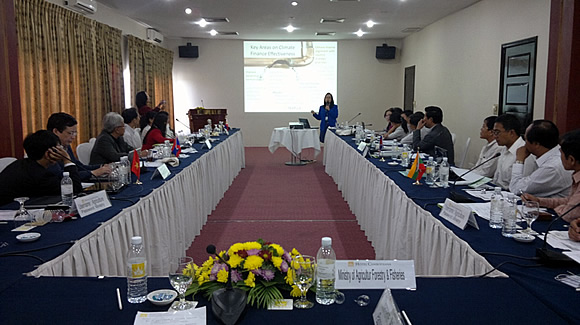The policy roundtable had two expert and four country presentations in order to (1) discuss an array of adaptation strategies on coping with the challenges in agriculture and food brought about by climate change; (2) develop an appreciation for the requisites for an enabling environment to meet its challenges; (3) understand mainstreaming approaches and challenges; (4) identify appropriate entry points at both policy and implementation levels for integrating climate change adaptation strategies into development plans; (5) identify financial instruments to fund efforts in mainstreaming; and (6) explore possible partnerships between and among APAN, SEARCA, other APAN nodes, governments, and other development organizations to actively collaborate on research, capacity building, and other activities to mainstream adaptation strategies in the agriculture sector. Aside from an expert, participants included eight senior and middle-level agriculture and environment officials and senior policy researchers from Cambodia, Lao PDR, Myanmar, and Vietnam (CLMV) as participants, plus 15 observers from MAFF and partners in Cambodia and six from SEARCA and the University of the Philippines Los Baños (UPLB).
Dr. Juan M. Pulhin, UPLB Professor and Dean and Coordinating Lead Author for Working Group II of the Fifth Assessment Report of the Intergovernmental Panel on Climate Change (IPCC), presented two views in mainstreaming climate change adaptation (CCA) into development plans and investments. One view decides on adaptation based on technology and projected climate change impacts, while the second view grounds adaptation planning on vulnerability assessment. He advocated a participatory and holistic approach to mainstreaming CCA.
Dr. Pulhin presented three mainstreaming frameworks advocated in the development community and the Philippine experience in mainstreaming CCA from national policy to an eco-town implementation approach. He then discussed the challenges and prospects for mainstreaming CCA, specifically on communicating and coordinating it vertically and horizontally from national to sectoral to local levels, provision of wide and financial support, capacity strengthening, ensuring political will, with due emphasis on the importance of robust and reliable research and development.
Dr. Bessie M. Burgos and Dr. Maria Celeste H. Cadiz collaborated on explaining a presentation by Mr. Naderev M. Saño, Philippines Climate Change Commissioner, on Financing CCA. The presentation essentially provided principles in climate financing, the financial architecture for climate change adaptation and mitigation (CCAM), online sources of more information on climate financing, and tips on sourcing funds for CCA.
The four country presentations from Cambodia, Lao PDR, Myanmar, and Vietnam revealed varying extents of CCAM mainstreaming integrated with disaster risk management and green growth in national policy, strategy and action planning down to local levels, each with unique experiences and practices to share. A common need for capacity strengthening and climate financing emerged. Vietnam demonstrated a strong commitment for CC mitigation and demonstrated a strong research base for CCAM mainstreaming.
In a workshop, the participants summarized what they learned and identified gaps and discussed ways forward for research, capacity development, policy and governance, and in other concerns, one of which is MAFF’s proposed regional project endorsed during the 35th AMAF meeting. The results of the roundtable discussions and the workshop are embodied in a Policy Roundtable Statement which is being finalized.
